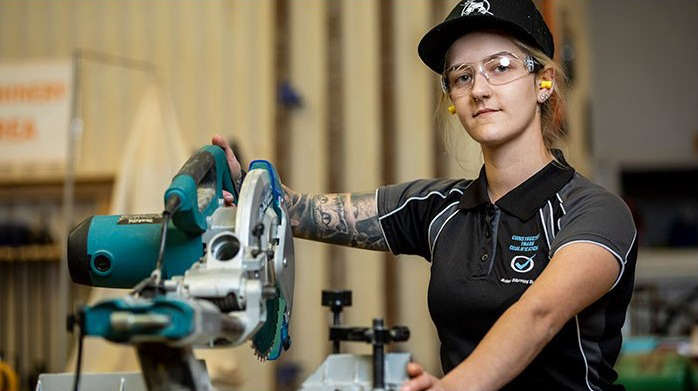It’s the moment your child’s been waiting for.
Formal’s coming up. Exams are looming. Twelve years’ of schooling is almost complete.
But the question is… then what?
To go to university or TAFE? Undertake a VET or apprenticeship or traineeship? What about a private college? Or something else altogether?
The smorgasbord of post-school pathways available can be seriously overwhelming and confusing for school leavers and parents alike.
While we’ve found most young Aussies (79%) have a well-rounded understanding of how university works, just over half (53%) have a grip on what TAFE entails, around one-third understand apprenticeships (33%) and VET (31%), and 19% understand the concept of traineeships.
Concerningly, 7% of young Aussies don’t understand the ins and outs of any post-school pathway.
Awks.
But never fear, that’s where we come in to help you guide your Gen Z child through the process of selecting their next steps after school.
Here’s a rundown of the most popular post-school pathways (and how they differentiate).

University
There’s always been an overarching stigma that university is the best post-career pathway. But ultimately, it depends on the profession your child wants to pursue.
For example, if your child wants to pursue a career in law, medicine, science, teaching, engineering, economics, communication/journalism, philosophy, languages, or fine arts etc – they’ll need a formal university qualification. The flexibility of paying for it can also make it a little easier/more economical option, with HECS-HELP and FEE-HELP available to all Australian citizens studying in a Commonwealth-supported institution.
Qualification types: Bachelor’s Degree. Honours Degree. Master’s Degree. Doctorate Degree (PhD). Post Graduate Diploma.

TAFE
TAFE is ideal for students who aren’t pursuing a career that requires a formal qualification and prefer a mix of classroom learning and practical experience.
TAFE courses – which range from a few months to three years – kickstart careers in business, engineering, agriculture, sales and retail, ICT, creative industries and more. They’re super flexible, can be fast-tracked to get your child qualified faster and many offer guaranteed internships or placements upon completion to help your child get off on the right foot once they finish their course.
TAFE courses can also be used as an alternative pathway into university by counting as a credit of one or two years towards a degree.
Qualification types: Graduate Certificates, Associate Degrees, Bachelor Degrees & Microcredentials

VET
Vocational Education and Training (VET) is great for students who are sure of their post-school pathway and want to learn the essential skills and qualifications to get there.
The nationally-recognised VET courses – which typically range from 6 months to 2 years in duration – give hands-on, practical experience for careers in construction, manufacturing, business, hospitality, transport and more. One of the perks? The opportunity to learn from a mentor currently working in the industry.
Students might also be eligible for fee-free apprenticeships or traineeships from state governments, which is worth looking into.
Qualification types: Certificates I-IV through to Advanced Diplomas (and even some degrees)
Apprenticeships
Apprenticeships, on the other hand, combine practical on-the-job training and formal study with a Registered Training Organisation (RTO) and can be undertaken while finishing secondary school, post-graduation or even as a mature student looking for a career change.
Usually 3.5 to 4 years duration, apprenticeships are a great alternative for those who are interested in one of the 500 occupations that offer structured training agreements – from traditional trades to tourism, telecommunications and retail. Another perk? Apprenticeships are paid, helping students avoid the financial burden/debts that come with formal university or TAFE education.
Qualification types: Nationally-recognised qualifications

Gap Year
Okay, okay. This might not be a post-school pathway you were expecting here, but there are indeed myriad benefits to undertaking a gap year – especially if your kid isn’t quite sure what they want to do with their career.
And before you think that a gap year might set your kid back – on the contrary, statistics show that students who take a gap year are actually more likely to complete a degree (or qualification) than those who enter a post-school pathway straight after school. The life experience to be had during a gap year can help your Gen Z child expand their horizons while giving them time to reflect and explore their interests.
Qualification types: Life experience!







